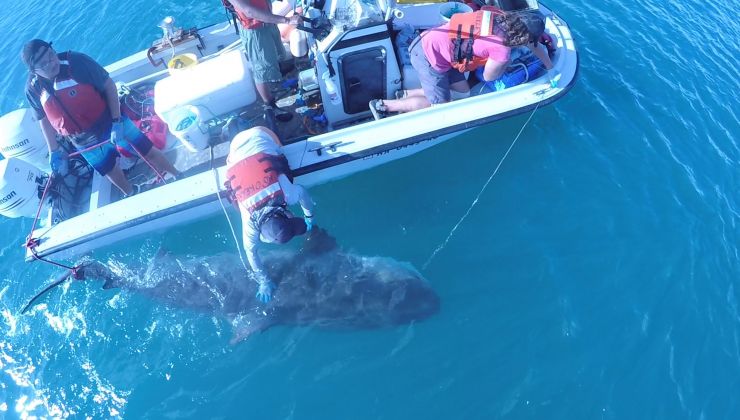
When: Friday. January 10, 2019, 5 p.m.
Where: NELHA Gateway Center
Presenter: Prof. Kevin Weng, Virginia Institute of Marine Science, College of William & Mary
An adult tiger shark is a beautiful and majestic animal -- but most of our knowledge of the species' life cycle comes from a large culling program that killed sharks en masse. Large sharks are difficult to observe and sample, but we can use non-lethal methods like satellite tags and ultrasound machines to learn about their biology. Prof. Weng's research group is searching for gravid female tiger sharks using an ultrasound machine, which allows them to see the embryos inside the mother's uteruses. In the future they aim to study the movement and habitat use of gravid females using satellite tags.
They are also using the ultrasound machine to measure the heart rate of the sharks we are studying. Heart rate, the rhythm of life, is one of the most important biological rates. It is a proxy for metabolic rate, and provides clues to the ecological activities of species that are difficult to observe. They are trying to establish the normal heart rate for a tiger shark and how it might change with stress and exhaustion.
Prof. Kevin Weng received a master's degree from University of Hawaii at Manoa in Oceanography, and a PhD in biology from Stanford University. He now teaches at the Virginia Institute of Marine Science and studies the habitats of marine animals and how they are changing as a result of man-made perturbations. This project is a collaboration between the Virginia Institute of Marine Science, Arizona State University, and the University of Hawaii at Manoa.
After the presentation, we will have pupus, drinks, and conversation. We are informal and it is potluck, so please bring a pupu and non-alcoholic beverage to share. Reusable plates and cups are encouraged, as is taking home your own trash.
Agenda:
5:00-5:15 p.m. Gather and Networking
5:15-6:15 p.m. Presentation and Q&A
6:15-7:30 p.m. More Networking, pupus
